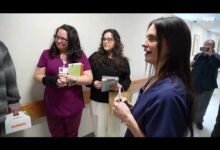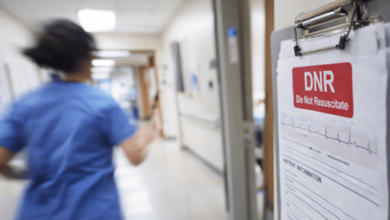New leadless pacemaker gives Yorkshire nurse ‘her life back’

A nurse in her 20s who had to put her life on hold after being diagnosed with a serious heart condition has been able to get back on track after a new leadless pacemaker was implanted.
The pacemaker device can be implanted directly into the heart using a minimally invasive procedure that avoids the need for an incision to the chest near the heart.
“The new leadless system provides a game-changing solution to patients”
Nigel Lewis
The device is suitable for a small group of patients with certain medical conditions, including Emily Coles, 24, a staff nurse from Rotherham in South Yorkshire.
Ms Coles was diagnosed with reflex syncope associated with sinus pauses, following a collapse at home last year.
She experiences unpredictable blackouts that were associated with her heart pausing for more than 10 seconds, meaning she could not drive and needed to take other lifestyle precautions.
She said: “My condition took away my independence and my confidence and I was unable to do the things I love and had taken for granted.
“Not being able to drive had a big impact on my life, as I’m a staff nurse and work 12-hour shifts,” she noted.
“Being told that I could collapse at any point was not something I wanted to hear as I am a young person who likes to keep fit and healthy,” she added.
However, heart specialists at Sheffield Teaching Hospitals NHS Foundation Trust informed Ms Coles about the new leadless pacemaker device that is smaller in size than an AAA battery.
It is designed to treat appropriate patients with slow heart rhythms and is implanted directly into the heart using a minimally invasive procedure that avoids the need for an incision to the chest.
The device, which is suitable for a small number of patients with certain medical conditions, operates without the need for leads, with the battery and electronic chips housed within its compartment.
Ms Coles was among the first patients in the North of England, and one of the first at Sheffield Teaching Hospitals, to benefit from the new device.
“My life had been on hold since I collapsed on 2 September, and I struggled to come to terms with the idea of having a pacemaker fitted at the age of 24,” she said.
“It’s been a few weeks after my op, and I will soon be able to resume driving again, something I had taken for granted before my diagnosis,” she noted.
“I will also be able to exercise again and reinstate my gym membership, and I can look forward to doing the things I never questioned I might not be able to do.
“Without this device, my future would be looking very different.”
A specialist team, including cardiologists and nurses, at the South Yorkshire Cardiothoracic Centre, implant the devices for suitable patients in South Yorkshire and North Derbyshire, and beyond.
Consultant cardiologist Dr Nigel Lewis said: “The new leadless system provides a game-changing solution to patients who require less frequent ‘pacing’, particularly those on dialysis and younger patients who are otherwise fit and healthy.
“Patients with atrial fibrillation and those with risks of infection requiring a pacemaker are also set to benefit,” he said.
He added: “These new devices are an advance in technology and have been shown in most recent clinical trials to have low complication rates and excellent predicted battery longevity.”

Dr Nigel Lewis and the leadless pacemaker







